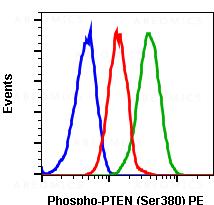| |
| Alternative Name : | Phosphatidylinositol 3,4,5-trisphosphate 3-phosphatase and dual-specificity protein phosphatase, Mutated in multiple advanced cancers 1, MMAC1, Phosphatase and tensin homolog, TEP1 |
| Immunogen Information : | A synthetic phospho peptide corresponding to residues surrounding Ser380 of human phospho PTEN |
PTEN has been identified as a tumor suppressor gene and has been found to be mutated in a significant number of human cancers, including prostate, brain, and breast cancer. PTEN shares sequence homology with the protein-tyrosine phosphatase (PTPase) family of proteins and negatively regulates the PI3K/Akt pathway. PTEN de-phosphorylates target proteins, and recombinant PTEN has been shown to have phosphoinositide 3-phosphhatase and inositol phosphate 3-phosphatase activity. Studies of primary tumor cells show a loss of PTEN expression after metastasis to the brain, via astrocyte-derived microRNAs. A cluster of phosphorylation sites (S380, T382, T383, and S385) in the C-terminal tail of PTEN drive a conformational change that reduces PTEN activity by inhibiting membrane interactions.
For flow cytometric staining, the suggested use of this reagent is 5 µL per million cells or 5 µL per 100 µL of staining volume. It is recommended that the reagent be titrated for optimal performance for each application.
For Research Use Only. Not for use in diagnostic/therapeutics procedures.
| There are currently no product reviews
|





